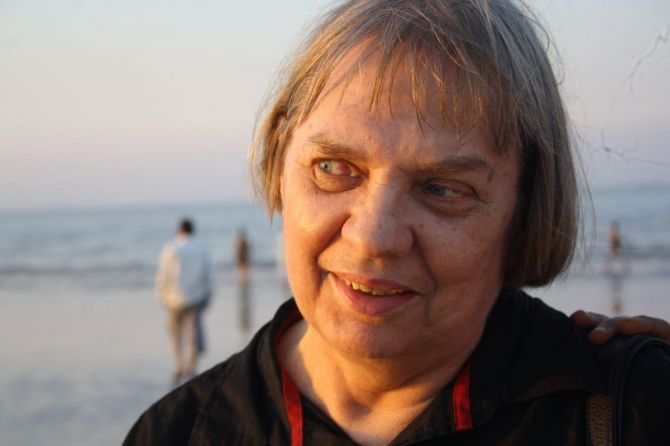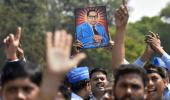'After Ambedkar, Dr Gail was the only writer who wrote critically on caste issues.'

Dr Gail Omvedt, 81, who passed away in a village in Maharashtra on Wednesday, was one of India's leading scholars on caste studies.
Dr Omvedt came to India from the United States of America in the early 1970s as a PhD student to study Mahatma Phule's Satyashodak movement and made India her home.
Over the last 50 years she wrote countless articles and books on the caste system in India.
Somnath Waghmare, a PhD scholar at the Tata Institute of Social Sciences in Mumbai and documentary film-maker, is making a film (external link) on Dr Omvedt and her husband, Marxist scholar Bharat Patankar.
"If you believe in a casteless society, then Gail Omvedt's writings are a must-read," Waghmare tells Syed Firdaus Ashraf/Rediff.com about Dr Omvedt's contribution to understanding India's complex caste system.
Dr Gail Omvedt came from a family which was involved in the black rights movement. Her family background was in the anti-racism movement.
As a student she was working on human rights issues in the USA and for black rights. I think she came to India when she was 27 years old.
Her reason to come to India in the 1970s was to work on Mahatma Phule's Satyashodak movement, on which she wanted to do a PhD thesis.
Today, one of her books, Cultural Revolt in a Colonial Society (The Non Brahman Movement in Western India), is very famous.
Gail was an anti-caste scholar.
Through her writings she established Mahatma Phule and Dr Babasaheb Ambedkar as scholars.
Before her, academia was dominated by savarna (upper caste) liberals.
These savarna liberals completely ignored the importance of caste.
Mahatma Phule was also a writer, but he mostly wrote in Marathi.
Gail's writings established Phule, Ambedkar and other Bahujan leaders as scholars.
Dr Ambedkar was an academician, but for a long time Indian liberals only glorified Mahatma Gandhi as a scholar.
Gail also wrote on the saint movements of Maharashtra.
She came from a developed country like the USA in the 1970s and worked for Dalits and marginal communities all her life.
Indian society needs to read Gail Omvedt's writing.
If you read her works, it will be easy for you to understand Indian societal problems.
After Ambedkar, Dr Gail was the only writer who wrote critically on caste issues.
If you believe in a casteless society then the writings of Gail are a must-read.
She died in a small village, Kasegaon, in Sangli in western Maharashtra.
Any scholar working on Adivasis or Dalits would never prefer to stay in rural areas. Most of them would love to live in big cities, but she did not do that.
She was not only a writer, but an activist academician. She spoke good Marathi as well.
I happened to meet her because my village is very close to Gail's village.
During my graduation I happened to meet Gail's husband Bharat, who is an activist.
I have seen how Gail and he travelled together for any protest movement. They practised equality in real terms. They treated everyone on equal terms. Be it a student, a farmer or a journalist.
Another thing which I observed was that they never ate in restaurants when they went to protests. They always carried food from home. They always carried extra food for one or another person participating in the protests.
In India, if you wrote on Mahatma Gandhi or Jawaharlal Nehru during Congress rule, you automatically got a Padma Bhushan or Padma Vibhushan.
The Congress ignored Mahatma Phule and Dr Babasaheb Ambedkar's work, so it was natural that they ignored Gail's writings too as she was writing on them.
In her life, Gail brought the Phule-Ambedkar discourse to the Brahminical-Gandhian academic space and through her writings and lectures constantly challenged their orthodoxy.
Today, the media celebrates Arundhati Roy, but they never celebrated Gail's work. Gail never got media space like Arundhati Roy did.
Gail wrote an open letter to Arundhati Roy (extrernal link) which is a must read if you want to understand her mind.
If anyone foresees India's future as a casteless society, then s/he has to read Gail's work.
She writes very powerfully. She is politically very correct. She also writes very honestly.
During my documentary work on Gail and Bharat, I spoke to them on analysing the caste society. They spoke on gender issues and also against right wing politics.
We love and carry her long legacy of writing and activism in our hearts.
Gail was a gem of a person.
My documentary is now in the post-production stage and will be released soon.











 © 2025
© 2025